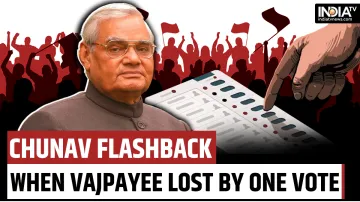Atal Bihari Vajpayee is known as one of the most successful Prime Ministers of India who served the office three times. Known as a man of the masses and a leader firm in his political convictions, Atal Bihari Vajpayee on October 13, 1999 took charge as Prime Minister for the second consecutive term at the head of a new coalition government, the National Democratic Alliance. He was Prime Minister for a short period in 1996. He is the first Prime Minister since Pandit Jawaharlal Nehru to have become PM with two successive mandates.
However, exactly 23 years ago, the NDA govt led by PM Atal Bihari Vajpayee faced a confidence motion in the Lok Sabha.
In February 1998, early Lok Sabha elections were called after the fall of the weak Janata Dal government. For the 1998 elections, BJP formed the National Democratic Alliance (NDA), a pre-poll coalition of diverse parties like AIDMK, SAP, BJD and SAD among others. The alliance won 259 out of 543 seats, which was close to the majority mark but still not enough. To achieve a majority, the BJP convinced TDP (12 seats), INLD (4), AC (2) and 3 independents to join the NDA post-poll. 2 Anglo-Indian MPs were nominated by the BJP. The NDA now had 282 MPs out of 545, well past the majority mark of 273. Thus they survived the initial confidence vote.
The BJP managed to woo the TDP by offering the prestigious post of Lok Sabha speaker to it. Ganti Mohana Chandra Balayogi, TDP MP from Amalapuram, was elected as the Speaker, and TDP joined the NDA. J Jayalalithaa, the charismatic ADMK leader, realised that the survival of the NDA govt depended on her party's 18 MPs. She leveraged her position as kingmaker to the fullest, getting as many as six union ministries for her party.
At the same time, the NDA was boosted elsewhere by the addition of JKNC (3), pushing its total to 284 after Buta Singh's exit. The addition of JKNC was a big coup, as the BJP's long-held demand for the abolition of Article 370 had been a point of contention.
In February 1999, the NDA was rocked by the withdrawal of INLD in protest against its move to "increase prices of wheat, rice, sugar, urea and cooking gas". NDA's total tally fell to 280 and Jayalalithaa's importance in the alliance continued to grow. However, it almost managed to save the rocking boat. And all it needed was just 1 vote.
The scenario
The Speaker (a TDP MP) is not allowed to vote on any motion unless there is a tie, in which case he can cast a tie-breaking vote. The potential NDA votes were 271 and the potential Opposition's vote were 270. The thorny point of contention was the voting eligibility of Giridhar Gamang, Congress MP from Koraput (OR). At that time, he had just taken up the post of Chief Minister of Orissa, while retaining his Lok Sabha seat. The NDA demanded that he be disqualified from voting. After a heated debate, the Speaker ruled that Gamang was eligible to vote as he was yet to win a seat in the Orissa Legislative Assembly and hence entitled to keep his Lok Sabha seat till then.
The result
At the last minute of voting, it was noted that Wangcha Rajkumar, AC MP from Arunachal East and Saifuddin Soz, JKNC MP from Baramulla, SR Muthiah, ADMK MP from Periyakulam also engaged in cross-voting by voting against the government. However, it was Giridhar Gamang's vote that turned the tables against the NDA. The final vote tally stood with NDA with 269 and Opposition with 270. The Vajpayee govt fell by just one vote, leading to a fresh election in 1999.
Latest India News
